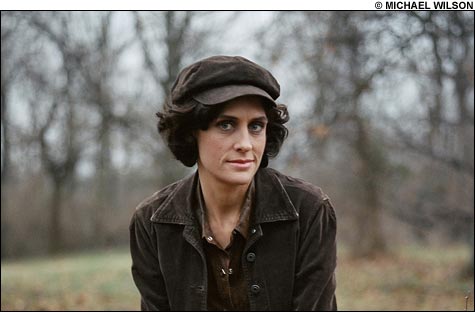
INSTRUMENTAL: “My whole life has been unspoken,” says the violinist of her first vocal album. |
WFNX Jazz Brunch Top 5
1. Marcin Wasilewski, January [ECM]
2. Esperanza Spalding, Esperanza [Heads Up]
3. John Ellis, Dance like There’s No Tomorrow [Hyena]
4. Revolutionary Snake Ensemble, Forked Tongue [Cuneiform]
5. DJ Logic/Jason Miles, Global Noize [Shanachie] |
Jenny Scheinman is such an unassuming, modest musician that it’s easy to underestimate the radicalness of her two new CDs, Jenny Scheinman and Crossing the Field. It’s not simply the proximity of the release dates. (The first disc is out now on Koch, the other is available on vinyl and as a download and will come out on CD sometime in the fall.) It’s not even that the first is a vocal record and the second instrumental. Neither is it the differences in style. The first mixes country, folk, rock, and blues; the latter is an amalgam of jazz improvisation and open-form composition — Ellington’s “Awful Sad” is here, and so are Scheinman’s takes on American hymn tunes, parlor ditties, Kurt Weill, circus music, African guitar pop, and 20th-century classical modernism. That in itself covers a lot of ground. But compare her plainspoken delivery of Mississippi John Hurt’s “Miss Collins” on Jenny Scheinman with the frightening threnody of clashing strings and throbbing drone in her “Einsamaller” from Crossing the Field. This isn’t like Esperanza Spalding going from a free-piano jazz trio to a jazz-pop vocal album, or Herbie Hancock writing a “jazzy” film score. It’s not even the difference between Pat Metheny and the Art Ensemble of Chicago. It’s more like the difference between Maybelle Carter and Alban Berg.Eclecticism is such a given these days that it’s almost a red flag — another word for dilettante. But Scheinman has come by her eclecticism honestly, and as you cozy up to the two CDs, it’s soon clear that they’re part of the same sensibility — someone enamored of “American music,” whatever that is. The sound of Scheinman’s Americana style is recognizable, but her radicalism has as much to do with audiences, performing traditions, and an attitude toward the marketplace.

Scheinman, who plays the MFA this Saturday night, has been a comer for the past decade or so — mostly as a violinist playing in bands led by Norah Jones, Lucinda Williams, Bill Frisell, Madeleine Peyroux, and the Brazilian guitarist and singer Vinicius Cantuária. In the meantime, she’s been releasing her own records, exploring her travels in Eastern European folk and klezmer and all manner of Latin-American music. But on 2006’s 12 Songs (Cryptogramophone), she more or less zero’d in on the American-ness of her sound — 12 instrumentals that in some cases seemed to cry out for lyrics.
Now, writing different songs, she’s come up with some. Four of the 11 songs on Jenny Scheinman are originals: stories of an aunt who disappeared (“The Green”), an enigmatic drifter (“Skinny Man”), an isolated country family (“Newspaper Angels”). And there’s the one full-on guitar-rocker, “Come On Down,” an invocation, a plea for love or at least salvation.
But it’s the opener, the Bob Dylan arrangement of the traditional “I Was Young When I Left Home,” that sets the table: Scheinman’s affectless vocals, a character who could easily be a young man as a young woman, Tony Scher’s slide guitar, Tim Luntzel’s bass, all spare, with Scheinman’s voice up front and untreated, her fiddle country-raw. That directness, the fully imagined unity of the arrangement, carries her through the whole CD and its apt choice of covers — in addition to “Miss Collins,” there’s Lucinda Williams’s “King of Hearts,” Jimmy Reed’s “Shame Shame Shame,” the Platters’ “Twilight Time,” Tom Waits’s “Johnsburg, Illinois,” and fellow Brooklynite Rebecca Fanya’s “Rebecca’s Song.”
Recorded in Scher’s Brooklyn apartment, Jenny Scheinman leans heavily on his guitar, with Frisell, Luntzel, and drummers Kenny Wollesen and Steve Jordan. And it’s as much a guitar record as a Scheinman vocal record. Crossing the Field, on the other hand, entailed a full string section, with solo settings for Frisell, pianist Jason Moran, and cornettist Ron Miles as well as Scheinman’s violin. There’s little here as simple as a 32-bar pop song form or a 12-bar blues. Even “Hard Sole Shoe,” which sets up a funky blues vamp for a Moran piano solo, spins off into call-and-response patterns for the string section, a passage of extended piano solos alongside a long string melody, a Scheinman solo, and then a mysterious extended string crescendo/decrescendo and fade-out with Doug Wieselman’s clarinet over bass, lightly strummed guitar, and a powdery dusting of effects. Throughout the CDs, Scheinman’s own playing defers multi-note pyrotechnics in favor of her warm tone, conversational phrasing, and rhythmic incisiveness. When her fiddle picks up the melody in “I Was Young When I Left Home,” it’s another voice, in conversation with itself.